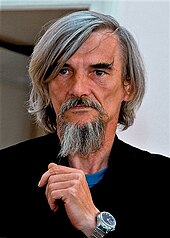Yuri Alexejewitsch Dmitrijew
Juri Alexejewitsch Dmitrijew (also transcribed Jurij Dmitrijew ; Russian Юрий Алексеевич Дмитриев ; born January 28, 1956 in Petrozavodsk ) is a Russian human rights activist .
He was adopted from an orphanage at the age of one, raised in the family of a Soviet officer and spent much of his childhood in Dresden . He studied at the Medical Faculty of the Northwestern Health Department in Leningrad without finishing his studies. Between 1988 and 1991 Dmitriev worked as an advisor to the People's Deputy of the USSR, Mikhail Zenko. It was then that he first encountered the mass graves of people shot in the 1930s.
Initially, Dmitrijew was a junior partner of Ivan Tschuchin, a member of the Supreme Soviet and State Duma of the RSFSR (1990-1995) and the first chairman of the human rights organization Memorial in Karelia. When Tschuchin, a retired police officer, was killed in a car accident in May 1997, Dmitriev went out to work alone.
On July 1, 1997, Dmitrijew discovered a mass grave with 9,500 bodies in Sandarmoch near Powenez . In the summer of 1998 he examined another mass grave with 1,000 bodies in Krasny Bor (Beautiful Grove), a forest area 19 km west of Petrozavodsk, which had been discovered by ID and SI Chugunkov the year before. Both graves date from the time of the Great Terror . In addition, he examined the history of the Solowezker Camp for Special Use (SLON) and the Belbaltlag camp complex for the construction of the White Sea-Baltic Canal .
After investigators had found nude photos of his adopted daughter from Dmitrijev's computer in 2016, which experts did not classify as child pornography, he was detained from December 2016 to January 2018. He had made the pictures according to his own representation in order to document the development of the malnourished child. In April 2018, he was acquitted in the Petrozavodsk City Court on allegedly politically motivated charges of producing child pornography.
Dmitriev was arrested again after his acquittal in June 2018, and the verdict of the Petrozavodsk City Court was reversed. He was accused of violent sexual acts against his adopted child daughter. Dmitrijew denied all allegations from the start that his research over the past decades into repression and mass executions under Stalin should be discredited. Memorial said that no one believed the allegations were true. According to Human Rights Watch , Dmitriev's charges are to be seen in the context of alleged efforts by the Russian authorities to belittle Stalin's crimes . On July 22, 2020, Dmitriev was sentenced to three and a half years in a camp, which he will serve until November 2020, including pre-trial detention.
Web links
- The Dmitriev Affair: The Life's Work and Trial of Yury Dmitriev dmitrievaffair.wordpress.com (accessed July 22, 2020)
- The Dmitriev case - an overview memorial.de (accessed on July 22, 2020)
- The Ghosts of the Past Dekoder.org (accessed July 22, 2020)
- The echo of Sandarmoch. How the sentencing of Karelian historian Yuri Dmitriev will change Russia and us Journal 7x7, (Russian, accessed July 22, 2020)
Individual evidence
- ↑ S. Lebedew, Interview with Juri Alexejewitsch Dmitrijew Magazin Colta, February 2, 2018 (Russian, accessed July 22, 2020)
- ↑ a b Irina Galkowa: Interview with Yuri Alexejewitsch Dmitrijew , May 1, 2017, (Russian, accessed July 22, 2020)
- ↑ https://dmitrievaffair.com/remembrance/krasny-bor/
- ↑ a b c d DER SPIEGEL: Russia: Stalin researcher sentenced to three and a half years in prison - DER SPIEGEL - Politics. Retrieved July 22, 2020 .
- ↑ Krasnij Bor Memorial Cemetery , Memorial (Russian, accessed July 22, 2020)
- ↑ Biography of Yuri Alexejewitsch Dmitrijew , Memorial (Russian, accessed July 22, 2020)
- ↑ Moscow commemorates Stalin victims , FAZ.net, October 29, 2017.
- ^ A b Friedrich Schmidt: Stalinism researcher: historian Dmitrijew sentenced to three and a half years in a camp . In: FAZ.NET . ISSN 0174-4909 ( faz.net [accessed July 22, 2020]).
- ↑ Silke Bigalke: In the shadow of terror. Retrieved July 21, 2020 .
| personal data | |
|---|---|
| SURNAME | Dmitrijew, Yuri Alexejewitsch |
| ALTERNATIVE NAMES | Дмитриев, Юрий Алексеевич (Russian spelling) |
| BRIEF DESCRIPTION | Russian human rights activist |
| DATE OF BIRTH | January 28, 1956 |
| PLACE OF BIRTH | Petrozavodsk |
